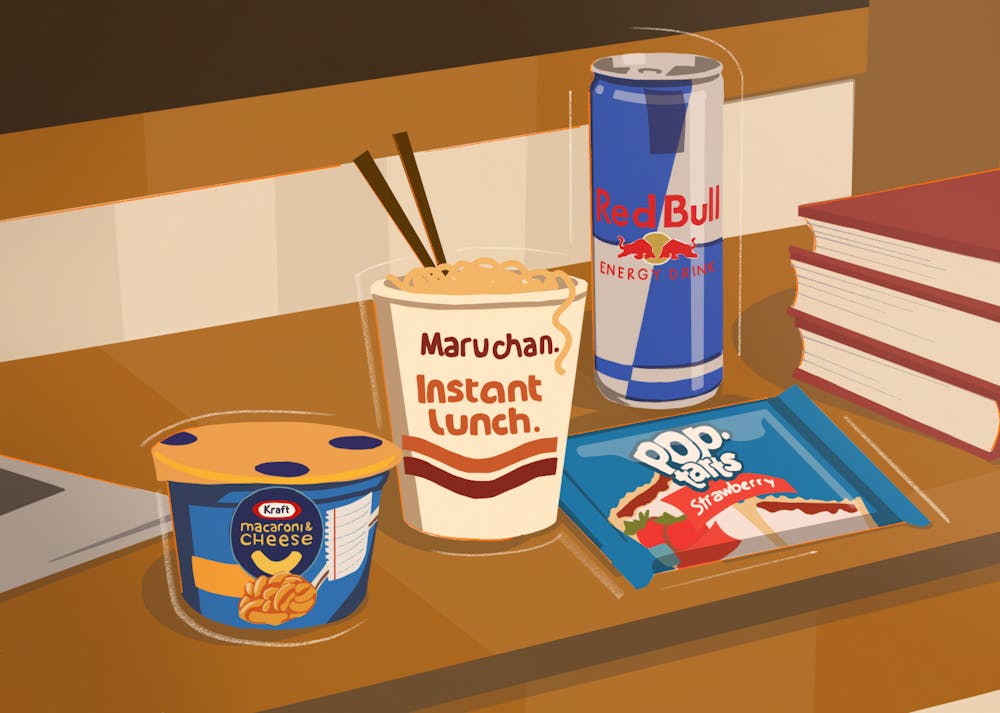While eating at university fast food restaurants and dining halls is easy, taking time out of the day to figure out a nutritious eating plan is important to stay healthy and preserve energy in the classroom.
Kathleen Dixon, a clinical professor at the College of Health Solutions, said that her experience in a university dorm was strikingly different from modern living.
According to Dixon, she lived in a UA dormitory called "Pima Hall," where students — instead of eating at a dining hall or relying on a meal plan — routinely cooked for each other.
"As part of living there, you were assigned chores," said Dixon. "So your chores could be cleaning the bathrooms, it could be answering the phones, it could be cooking breakfast, it could be cooking lunch, it could be planning the menus. I was the menu planner for one year. It was quite the experience."
ASU currently has dorm dining halls and fast food restaurants embedded on campus for students to enjoy. While these are convenient, they don't supply the healthiest options for students, leaving some to rely on snacks for nutrition.
"My dorm has a lounge with a kitchen, but I don't really go there to cook food," Miguel Aguirre, a freshman studying supply chain management, said. "I'm usually busy, so I need grab-and-go snacks. It's just convenient."
Aguirre said that the main snacks he gets are from his mom, supplying him with protein shakes and chips, while other alternatives he gets from the P.O.D. Market includes Uncrustables.
"Most of the time I eat in the dining hall and I'll grab a few things to go, but when they have the hazelnut Uncrustables at the P.O.D., I'll grab those as well," Ralf Petitt, a freshman studying finance, said. "They're my favorite."
Petitt said another snack he regularly grabs from the dining hall is bananas. According to Petitt, they provide fuel for physical activity and prevent him from getting stomach cramps.
Dixon said that bananas are a great source of potassium and a tasty, inexpensive fruit.
"I think that they're the easiest fruit," said Dixon. "It takes four bites and you've had your fruit — and it's a good one."
Dixon said that access to a grocery store, like the Fry’s in downtown Phoenix, is very beneficial for students to purchase food like fresh fruits and snacks.
READ MORE: Farmer's guide to the galaxy: The future of agriculture on celestial bodies
"I would try to go once a week to a regular grocery store," said Dixon. "Maybe go together with a group of people and get yogurt, bananas, apples, carrots, some pita chips, some popcorn and then have it in your room for snacking."
Ava Hamilton, a freshman studying computer systems engineering, said she recommends CVS and the Trader Joe's on University Drive because they are within walking distance from the Tempe campus.
"I eat a lot of dried mangoes and protein bars," said Hamilton. "It's fast. It's easy. It's pretty healthy."
Dixon said that a downside with foods like dry fruits is the potential for overeating, but they are also incredibly rich in nutrients and contain a notable amount of fiber.
Dixon also said that while it is easy to overeat, all bodies process food differently and have different metabolisms and anatomy that can change the portions people eat.
"I think portion control is very personal, but I would still say one of the best things to do is take dried food, make a fruit and nut mix," said Dixon. "Now they're both very energy-dense foods, so you do still have to be careful that you're not eating a cup of this stuff."
Dixon overall recommends yogurt, fruit, vegetables, whole grain foods like pita chips, and dips like guacamole and hummus for students living in a dorm with access to a fridge, sharing similarities with the Mediterranean diet — a guideline consisting of fruits, vegetables, nuts and whole grain foods.
Robin DeWeese, an assistant teaching professor at the College of Health Solutions, said the Mediterranean diet provides a nonrestrictive way of eating healthy.
DeWeese said that students should avoid restrictive diets, as they can lead to the absence of necessary nutrients for the body to function.
"Most people would benefit greatly from not following a restrictive diet," said DeWeese. "Now, there are some people who have conditions where they have to follow a specific diet, but, in general, placing restrictions on yourself, it usually just backfires."
DeWeese said that balanced eating is important, but it doesn't hurt to allow foods that could be deemed unhealthy into a regiment.
"You don't want the main source of your diet to be chips and pop, candy bars, but it's not that you can't ever have that stuff," said DeWeese. "You just want to moderate it."
Aguirre shared the same mindset.
"Have a plan," said Aguirre. "Don't go on impulse. Try to get all your nutrition, but at the same time college can be stressful, so don't feel bad about going out every once in a while."
The professors also noted that students can mistakenly cut important nutrients in their pursuit of healthy eating.
DeWeese said an example she could recall was when her class discussed carbohydrates that many of her students believed they were supposed to avoid. She said that they provide energy, and many healthy foods like fruits and vegetables are classified as carbohydrates.
"If you constantly feel deprived, what way is that to live?" said DeWeese.
Edited by Katrina Michalak, Alysa Horton and Caera Learmonth.
Reach the reporter at gheadle@asu.edu and @George_Headley7 on X.
Like The State Press on Facebook and follow @statepress on X
George is a sophomore studying journalism and mass communication. This is his fourth semester with The State Press. He has also worked at Times Media Group and KJZZ.




